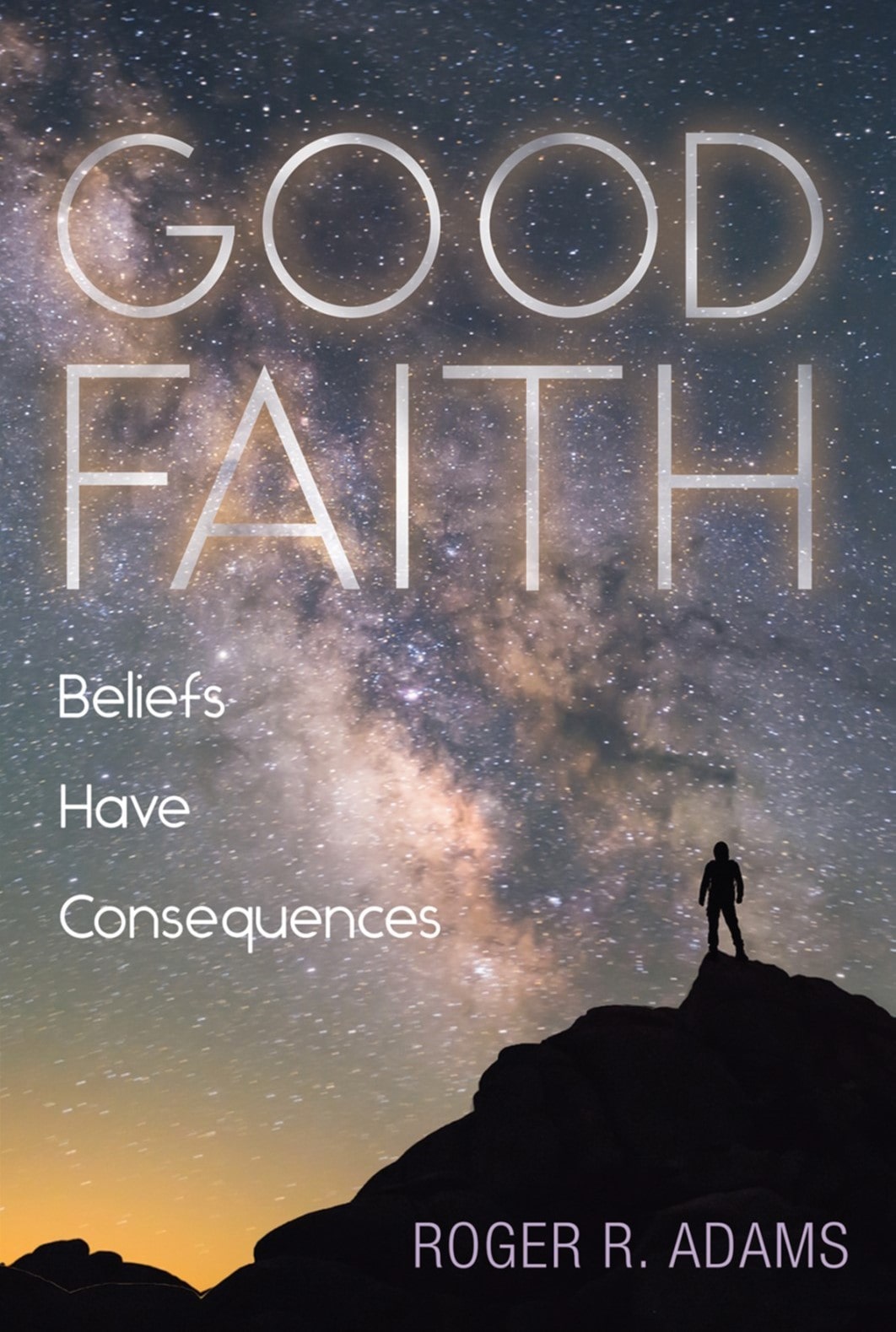Good Faith: Beliefs Have Consequences
by Roger R. Adams, Ph.D.
Beliefs have consequences.
Our beliefs about life’s “big questions”—
Who am I? How should I act? What’s my purpose for living?
—impact our lives and the lives of people around us.
Good Faith is for:
Inquisitive People
Our answers to existential questions—absorbed unconsciously from parents, friends, and cultures—become lenses for looking at the world, lenses that color how we understand ourselves and others. But our sources of answers don’t all agree. Their lenses are ground differently, and ones we choose to wear shape how we approach life, including our personal decisions and our relations with others. Good Faith provides a guide for choosing lenses.
Congregation Leaders
How do you respond to challenges to faith coming from a largely secularized yet also multi-religious society? Good Faith, with its analysis of various answers to existential questions, provides a resource for articulating criticisms of social systems, for dismantling cultural obstacles to faith, and for describing a deeper way of living. Within a congregation, the book’s assessment of the effects of different answers can stimulate self-evaluation of beliefs and make abstract theological issues clear and relevant.
Professors and Chaplains
You can confidently recommend Good Faith to young adults pondering the religious dimensions of choosing a career, finding a partner, and shaping a future.Good Faith would enhance reading lists for courses touching on religion and politics, religion and science, and religion in contemporary society. Good Faith offers informed discussion of existential issues, inviting readers to reflect on the implications of their own beliefs. Non-sectarian in approach, Good Faith engages the spectrum of religions using an inclusive criterion, the flourishing of all human beings.
Praise for Good Faith
"In this season of cultural fragmentation -- pandemic separations, political divisions, racial tensions, anti-immigrant retrenching - the choice to live a life of faith might seem divisive. Roger Adams' Good Faith not only provides a different perspective on the nature of choice in the life of faith, but actual criteria through which a person could query those choices. Not afraid of breadth, and thus providing a refreshingly big picture, this book will be of great use to thoughtful people who wonder what role religion might play in their inner lives, their moral decision-making, and their participation in this complicated yet amazing world."
Rev. Dr. Sarah B. Drummond
Founding Dean
Andover Newton Seminary
at Yale Divinity School
"Roger Adams demonstrates what makes for “good faith”! His book—based on his broad knowledge of science, Christian history and theology, psychology, sociology, and economics—is an excellent guide for all who seek to create religious communities dedicated to help people care for the planet and people in poverty, find meaning and value in life, cope when "bad things happen" and face death, make moral decisions and advocate for just public policies and social structures."
Rev. Dr. David Lull Professor Emeritus of New Testament
Wartburg Theological Seminary
"In Good Faith Roger argues that a healthy and compatible relationship between science and religion is not only possible but worth pursuing. With meticulous research in disciplines ranging from cosmology, physics, and evolution to epistemology and moral philosophy, Adams guides us fairly, logically, gently, and intelligently toward the discovery of criteria for a “good faith” in our 21st century world of science and technology."
Dr. James T. Bradley Past Mosley Professor in Science and the Humanities, Professor Emeritus in Biological Sciences, Auburn University, author of Recreating Nature: Science, Technology, and Human Values in the 21st Century
“With an accessible but comprehensive background of scientific, religious, and ethical knowledge, Adams charts how religious meaning and moral integrity can and must be compatible with science—and how human lives and community can be enriched when they are. The heartbeat of this timely book is Adams’s patient and thorough insistence that good faith and good reasoning should be helpful and not harmful to individual, collective, and global flourishing.”
Dr. Kristine Culp Associate Professor of Theology and Dean of the Disciples Divinity House, University of Chicago Divinity School
“In this book Adams has successfully conveyed academic discourses in sci ence, philosophy, and theology for a lay audience to address life’s big ques tions. Topics discussed range from quantum mechanics to the prisoner’s dilemma. There are many books in science and religion that are highly tech nical and specialized, but Adams reminds us once again that a big picture view is fundamentally important for the flourishing of all of creation.”
Dr. Arvin Gouw
University of Cambridge Faculty of Divinity;
Founding CEO of Bacchus Therapeutics;
Vice President of Research & Development, Rare Genomics Institute
